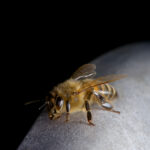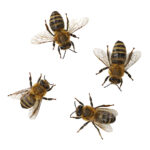How Can We Help?
Are honey bees aggressive?

Most of the time, honey bees will go about their business peacefully and won't bother humans unless provoked. However, they can get more defensive if their hive is under threat. If someone or something gets too close, the bees might see it as a danger and get more aggressive to protect their colony. This defensive behavior is more common in wild or feral hives, which tend to be more protective than managed ones.
Certain conditions can also make honey bees more prone to aggression. For instance, when food is scarce, bees might become more protective of their resources. Plus, Africanized honey bees, a hybrid species, are known for being more defensive than European honey bees. To avoid any issues, it's best to keep a respectful distance from hives and avoid sudden movements, helping ensure a peaceful coexistence with these busy pollinators.
What are the symptoms of a honey bee sting?
A honey bee sting typically causes immediate pain, redness, and swelling at the sting site. The initial symptom is a sharp, burning pain followed by a raised, red welt with a small white spot at the center where the stinger punctured the skin. The area around the sting may become swollen and itchy as the body's immune system reacts to the bee venom. For most people, these symptoms are mild and subside within a few hours to a couple of days.
In some individuals, more extensive local reactions can occur, with swelling spreading to a larger area around the sting site and lasting for several days. This extended swelling and redness are still generally not serious but can be uncomfortable.
A small percentage of people may experience systemic allergies to bee stings, which can be severe and require
Individuals with known bee sting allergies should always carry an epinephrine auto-injector (EpiPen) and seek medical advice on how to manage potential stings. Overall, while most honey bee stings are mild and manageable, being aware of the symptoms and knowing how to respond can help ensure safety. It is important to avoid disturbing these insects, and it is best to contact professional pest control technicians like us here at Youngs Pest Control for safe and efficient assistance.
